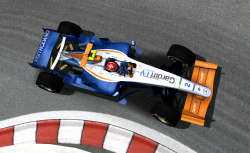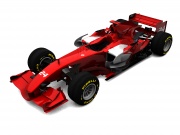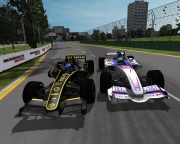2011 Superleague season

| |
| Competition | Superleague |
|---|---|
| Title Sponsor | N/A |
| Platform Used | |
| Rounds | 20 |
| Mod base | Custom (Based on FSONE 2009) |
| Carshape base | 2007 F1 (MMG) |
| Engine Supplier(s) | Mercedes, Ferrari, Renault, Toyota, BMW |
| Tyre Supplier(s) | Pirelli |
| Drivers | 43 |
| Teams | 12 |
| Drivers' Champion | |
| Teams' Champion | |
| Superleague Seasons | |
| 2000 · 2001 · 2002 · 2003 · 2004 · 2005 · 2006 · 2007 · 2008 · 2009 · 2010 · 2011 · 2012 · 2013 · 2014 · 2015 · 2016 · 2017 · 2018 · 2019 · 2020 · 2021 · 2022 · 2023 · 2024 | |
The 2011 Superleague season was the 12th GPVWC Superleague season.
2011 turned out to be another year in which the reigning Champion, in this case Finnish Janne Tanskanen, would not be defending his title. Tanskanen announced his retirement officially in a press statement just before Christmas, on the 23rd of December, 2010.
While the league clearly loses out on one hand, on another hand some people considered that both the Drivers' and Constructors' Championships to be thrown wide open. New talent had emerged at the end of the previous season and the rumour was that the league would be losing another of its top racing drivers and previous champion, Joe Consiglio, through retirement.
In the event, Consiglio didn't retire - signing another contract with Nordsjoen was surely going to keep the team's hopes high for consolidating a record-breaking four consecutive Constructors' titles in a row.
Contents
Pre-season
Testing
From the very first few laps of 2011 it was clear the Driver’s Championship would be contested by two men, Joe Consiglio (Nordsjoen Racing – Mercedes) and Lee Morris (Draig Racing – Ferrari). Morris topped the timesheets in Jerez and Hockenheim, while Consiglio blasted his way to the top in Portimao and Monza. With only tenths separating the two in all sessions, the theme for the upcoming season was set.
Synergetic’s Sam Millar looked like he would be able to at least challenge the top two and both Red Archer drivers looked in good shape to feature regularly in the top 5. The surprise of pre-season testing came from new kids on the block Midnight Motorsport. Dave Carr-Smith and Nick Rowland had both shown a promising turn of speed and would surely be capable of points and podiums in 2011.
Engines would again play a significant role in the Superleague season. Renault emerged as the strongest power unit and were holding a large advantage over the other manufacturers; particularly in low end torque. Ferrari and Mercedes were said to be 2nd and 3rd with Toyota and BMW bringing up the rear.
Report
Teams and drivers
† Mal McKee replaced himself as test/reserve driver with Liam Hatchell after the Japanese grand prix.
‡ Adam Rouse pulled out of the competition after the Austrian grand prix.
† Philip Cullen parted ways with Triple-Double Racing to free up a driver slot for Ric Scott in June.
New entries

The first new team to secure a place in the Superleague was Nijo Racing, owned and managed by Chris Williamson. Nijo came straight in from a successful Masters season, bypassing the Supercup, and looking eager to carry that success into the Superleague. Initially having signed Tom Parker and Ashley Walsh, the team underwent many changes in driver line-up in the first half of the season, with Parker pulling out after only a few races.
Triple-Double Racing was the next team to secure a place in the Superleague, founded and initially managed by Ben Warren before Phil Perkins took the reins scant days before the opening race. Driver Jyri Lylykorpi was initially linked with the team, however the team secured GPVWC stalwarts Adam Rouse and Phil Perkins.
The final new team to secure a place was Midnight Motorsport. Driver Nick Rowland's brainchild, the team managed to secure both himself and experienced racing driver and manager Dave Carr-Smith, which seemed to promise a strong team in bid for the Constructors' and Drivers' Championships. Reliability problems and bad luck were the order of the day for the beginning of the season for Midnight, however.
Team changes
- Due to inactivity there were three teams that became defunct at the end of 2010 - Argentina Racing Team, Oz Racing and CSG Racing. A lot of CSG's assets and expertise would end up going to the new Midnight Motorsport outfit.
- Whilst the management initially remained the same, the Yellowbirds GP team had new sponsors and so were rebranded as Computrac Motorsports for 2011. Gavin Thomas took over the management of the team mid way through the season.
- Williamson Dynamics moved their base of operations from their traditional base in England to the German city of Berlin and accordingly added the prefix 'European' to their team name. They too experienced a management change mid-season, as Adam Smith took over day to day operations of the team.
- A dispute amongst the Triple-Double Racing team in the opening races saw Ben Warren depart his own team, which was then taken over by Phil Perkins.
- Having had a bad 2010 season, Draig Racing threw caution to the wind and invested heavily in engines and drivers, leading the team to be in financial trouble part way through the season. The league then placed strict limitations on the team in relation to testing and development for the rest of the season.
Driver changes
- The decision of reigning champion Janne Tanskanen not to take part, along with the full return of Joe Consiglio meant a significant change to the Nordsjoen line-up. Jyri Lylykorpi was brought in to partner Consiglio, but he was replaced by test driver Pavel Loknovski from San Marino onwards.
- Having quit CSG in 2010, Lee Morris returned to GPVWC action with Draig Racing and was joined there by Scotsman Ryan Walker. Liam Hatchell initially joined the team, but bitter dispute unfolded after the start of the season and led Hatchell to return to Synergetic.
- Red Archer leader Nikos Evangelidakis took a step back from racing and hired Swiss driver David Jundt to partner Jason Muscat.
- 2010 Supercup champion Christoph Lichtenstein opted to move to Synergetic Motorsports alongside Sam Millar. He was replaced at Computrac by Gavin Thomas who partnered GPVWC 'newcomer' Wayne Mullins (who drove under the pseudo-name Ben Morgan.
- Nordsjoen reserve driver David Stanton returned to a full race seat at the ST Racing team.
- Dutch based driver Abdel Damghi joined Nijo Racing as the sudden disappearance of lead driver Ashley Walsh sparked a driver merry-go-round which eventually saw Tom Parker depart the team.
- GPVWC veteran Adam Rouse elected to withdraw from the series after Round 6 and was replaced at TDR by Supercup challenger Bart De Vos.
- Luis Fernando Laaff returned to GPVWC racing, replacing William Ponissi for a several races at Constant Racing.
- Several other drivers made their Superleague debut in 2011, including Ojay Clark, Petter Kaasa and Teemu Toikka.
- In the week between the Canadian and Brazilian rounds, Ryan Walker and Phil Perkins swapped places in the Draig and TDR teams.
2011 Calendar
Changes
- The calendar was extended to an unprecedented 20 Grand Prix for 2011 - 1 more than the previous season.
- The Hungarian Grand Prix and the Portuguese Grand Prix were both dropped from the calendar for 2011. The Argentine Grand Prix had initially been included in the calendar, but was later dropped in favour of the Turkish Grand Prix.
- 3 Grands Prix returned to the calendar in 2011 - The South African Grand Prix at Kyalami, the Austrian Grand Prix at the A1-Ring and the San Marino Grand Prix at Imola.
- While the British Grand Prix remained at Silverstone, the track layout was changed to post-2010 version of the circuit.
Rule changes
- The R&D system was tweaked to include a new area of car development - 'Draft', which focused on car's ability to closely follow another car.
- Rules on 'punting' were tightened after the Australian Grand Prix, so that anyone causing a minor collision had to surrender any positions gained as result or face a penalty.
Qualifying
- 2011 saw a dramatic change to the Superleague qualifying system with the introduction of a 2 part session with a knockout element. The first 20 minutes session would be open to all drivers, with only the top 12 runners going through to the final 15 minutes Q2 session.
- Along with the new qualifying format, parc ferme rules were introduced meaning that most setup options become locked after each driver's first qualifying lap.
Results and standings
Grands Prix
Scoring system
Points are awarded to the top 10 classified finishers.
| Position | 1st | 2nd | 3rd | 4th | 5th | 6th | 7th | 8th | 9th | 10th |
|---|---|---|---|---|---|---|---|---|---|---|
| Points | 15 | 12 | 10 | 8 | 6 | 5 | 4 | 3 | 2 | 1 |
Drivers standings
|
Bold - Pole |
† Drivers did not finish the Grand Prix, but were classified as they completed over 75% of the race distance.
‡ Ojay Clark finished 6th but was disqualified from the race for excessive corner-cutting. Positions behind him were therefore promoted by one place.
Constructors standings
|
Bold – Pole |
† Cars did not finish the Grand Prix, but were classified as they completed over 75% of the race distance.
2011 Car Gallery
| Preceded by: 2010 Superleague season |
2011 Superleague season 2011 |
Succeeded by: 2012 Superleague season |













 del.icio.us
del.icio.us digg
digg facebook
facebook googlebookmark
googlebookmark propeller
propeller reddit
reddit slashdot
slashdot stumbleupon
stumbleupon